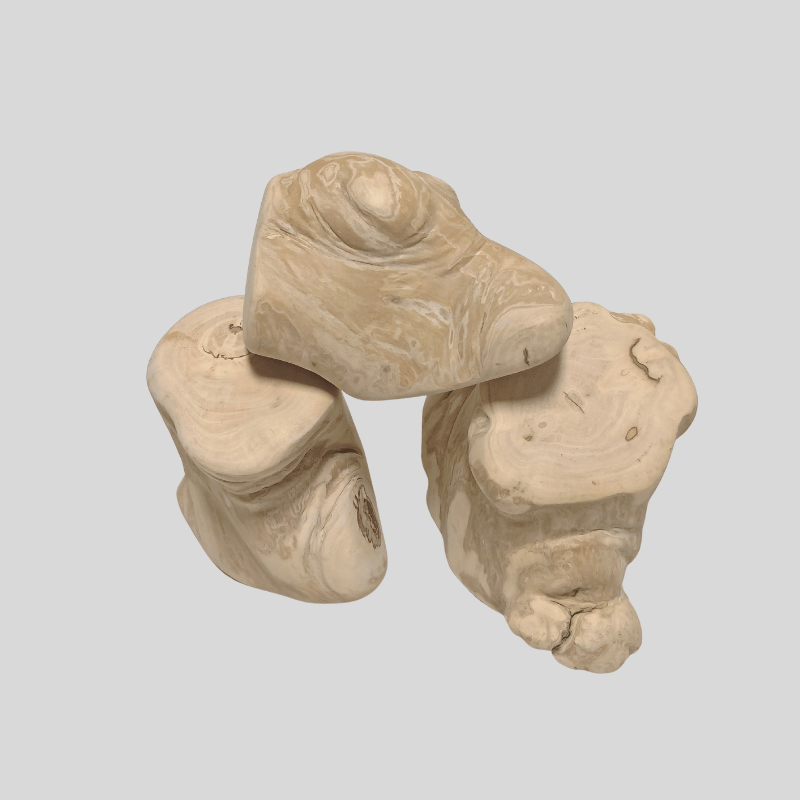Do you remember that moment when your dog was happily chewing in the corner… and then, out of nowhere, you spotted tiny plastic shards—or worse, heard a crunch that made your heart stop?
Many nylon chews are marketed as “tough” or “long-lasting,” but are they really safe for your pet?
Let’s break down the hidden dangers of nylon dog chews and why more pet parents are turning to wood chews as a natural, safer solution.
Why Nylon Chews Are So Popular (But Potentially Problematic)
There are several reasons why nylon dog toys have become so common:
- Claims of being “indestructible”
- Endless fun shapes and sizes
- Textured surfaces that “scrape” away plaque
- Affordable and low-mess
But behind the convenience, there are serious risks—especially for dogs that love to chew aggressively.
Hidden Dangers of Nylon Dog Chews
1. Tooth Fractures
The #1 concern. Nylon is usually harder than your dog’s teeth. The result? Not minor chips—often painful fractures that require costly dental work or extractions.
2. Sharp Plastic Splinters
As nylon wears down, it can splinter into sharp edges. These can cut your dog’s gums, lips, or tongue—and if swallowed, may lead to internal injuries.
3. Choking & Blockages
Small plastic fragments can pose a serious choking hazard or lead to intestinal blockages—especially for “gulpers.”
4. Chemical Ingredients
Low-quality nylon toys may contain BPA, phthalates, and artificial colors or flavors, all of which could pose health risks if ingested over time.
5. Gum Irritation & Enamel Wear
Rough textures can irritate the gums and gradually wear down your dog’s tooth enamel.
What Vets Say About Nylon Chews
Most veterinarians advise against nylon chews, especially for puppies, seniors, or heavy chewers. The material is simply too hard and carries too many risks.
Coffee Wood Chews: A Natural, Safer Alternative to Nylon
Coffee wood chews are gaining popularity among pet owners who want something long-lasting but gentler. Here’s why they’re a better choice:
- Tough but Tooth-Safe: Coffee wood is dense, but with a slight give—helping prevent tooth fractures.
- Naturally Splinter-Resistant: Wears down into soft, fibrous particles instead of sharp plastic shards.
- Zero Chemicals: No plastic, glue, dyes, or artificial flavoring—just 100% natural coffee wood.
- Calorie-Free: Great for dogs with sensitive stomachs or weight concerns.
- Eco-Friendly: Made from pruned coffee branches—no trees cut down.
- Dental Benefit: Helps clean teeth naturally through gentle abrasion.
Coffee Wood vs. Nylon Chews: Safety Snapshot
| Feature | Nylon Chews | Coffee Wood Chews |
|---|---|---|
| Tooth Safety | Very High Risk | Very Low Risk |
| Splinter Risk | Yes (Plastic shards) | Low (Soft fibers) |
| Choking Hazard | High | Low (With correct sizing) |
| Ingredients | Plastic, artificial additives | 100% Natural wood |
| Gum Irritation | Possible | Less Likely |
| Eco-Friendliness | Low | High (Sustainable source) |
| Best For | Not recommended for most dogs | Power chewers & safety seekers |
How to Use Coffee Wood Chews Safely
- Choose a size larger than your dog’s mouth
- Always supervise during chew time
- Discard small or worn-down pieces
- Not suitable for dogs who swallow large chunks whole
- Consult your vet if your dog has dental or digestive issues
Final Thoughts: Chewing Shouldn’t Be a Gamble
If you’ve ever winced at the sound of your dog crunching on hard plastic, or found sharp plastic pieces on the floor, you know the risks are real.
Nylon chews might seem like a durable solution—but they come at a high cost to your dog’s dental health.
Coffee wood chews provide the toughness dogs crave with a gentler, safer chewing experience. They’re natural, chemical-free, and designed to wear down safely—giving both you and your dog peace of mind.
💡 Pro Tip: If your dog loves to chew but you want to avoid another emergency vet bill, making the switch to coffee wood might just be the best decision you make.

